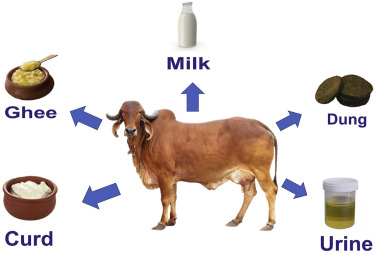Imagine walking through lush, vibrant fields where every plant thrives naturally, their colors bright and leaves rich with vitality. This isn’t just a dream; it’s a reality you can achieve with the power of nature itself.
Welcome to the world of organic farming, where cow dung and Panchagavya are not just traditional tools but are pivotal in transforming your farming practices. If you’re eager to enrich your soil, boost plant health, and embrace sustainable agriculture, you’re in the right place.
Dive into this article to discover how these natural fertilizers can revolutionize your farm and yield bountiful harvests, all while caring for the environment. By the end, you’ll see why these age-old methods are gaining momentum among modern farmers. Ready to unlock the secrets of nature’s powerhouse? Keep reading to learn more!

Benefits Of Cow Dung
Cow dung enriches soil with essential nutrients, boosting crop yield in organic farming. Panchagavya, made from cow dung and other cow products, enhances plant growth and pest resistance.
The use of cow dung in organic farming is nothing short of a revelation for those passionate about sustainable agriculture. It’s not just a waste product; it’s a powerhouse of nutrients and benefits that can transform your farming practices. Whether you are a seasoned farmer or a backyard gardener, understanding the benefits of cow dung can elevate your organic farming game. ###Enhancing Soil Fertility
Cow dung is rich in essential nutrients like nitrogen, phosphorus, and potassium. These nutrients are vital for plant growth and soil health. Imagine your garden flourishing with vibrant vegetables and lush greenery. By adding cow dung, you’re essentially nurturing your soil’s ability to support robust plant life. It’s a simple step that offers profound results. ###Improving Soil Structure
The texture of cow dung helps improve soil structure by promoting aeration and drainage. Good soil structure is crucial for root growth and nutrient uptake. Have you ever noticed how compact soil can stifle plant growth? By incorporating cow dung, you encourage a loose, crumbly soil that roots can easily penetrate. This means healthier plants and better yields. ###Promoting Beneficial Microorganisms
Cow dung is a natural habitat for beneficial microorganisms. These tiny helpers play a significant role in breaking down organic matter and making nutrients available to plants. It’s like having a team of invisible workers ensuring your plants get the best care. Next time you add cow dung to your garden, think of it as adding a health boost to your soil’s ecosystem. ###Reducing Chemical Dependency
Using cow dung reduces the need for chemical fertilizers, which can harm the environment and your health. Isn’t it empowering to know that you can grow food without relying on synthetic chemicals? By choosing cow dung, you’re opting for a cleaner, greener farming method that benefits both your family and the planet. ###Cost-effective Solution
Cow dung is often readily available and inexpensive, making it a cost-effective solution for organic farming. Have you ever considered how much money you spend on chemical fertilizers annually? Switching to cow dung can significantly cut costs, allowing you to invest in other areas of your farm or garden. ###Encouraging Sustainability
By using cow dung, you contribute to a sustainable farming cycle. This choice supports environmental health and reduces waste. Are you ready to take steps towards a more sustainable future? Embracing cow dung in your farming practices is a small change that can make a big impact. These benefits are not just theoretical; they’re practical and actionable. You have the power to transform your farming practices with something as humble as cow dung. Have you tried using cow dung in your farming or gardening? What was your experience? Share your thoughts and join the conversation on sustainable farming practices.Role Of Panchagavya
Organic farming benefits greatly from Panchagavya, which includes cow dung as a key component. This mixture enhances soil fertility, boosts plant growth, and strengthens natural pest resistance. It’s a natural solution embraced by farmers seeking sustainable agricultural practices.
When diving into organic farming, Panchagavya emerges as a natural game-changer. This traditional mixture, crafted from five cow products, is celebrated for its ability to boost soil fertility and plant growth. As more farmers turn towards sustainable practices, understanding Panchagavya’s role becomes crucial. ###The Composition Of Panchagavya
Panchagavya is a blend of cow dung, urine, milk, curd, and ghee. Each ingredient plays a unique role in nurturing plants. This concoction not only enhances the soil but also acts as a natural pesticide, protecting crops from pests. ###Benefits Of Panchagavya In Plant Growth
Have you ever noticed how some plants seem to thrive without much effort? Panchagavya might be their secret. It stimulates plant growth, leading to healthier and more robust crops. Plus, it increases resistance to diseases, making your plants less dependent on chemical interventions. ###How To Prepare Panchagavya
Creating Panchagavya is simple. Mix cow dung, urine, milk, curd, and ghee in specific proportions. Allow it to ferment for about a month. Regular stirring ensures a uniform blend. This preparation can be easily done at home, making it accessible for anyone interested in organic farming. ###Application Techniques
Applying Panchagavya is straightforward. You can spray it directly onto plants or mix it with irrigation water. Each method enhances nutrient absorption. Have you tried different techniques to see which works best for your crops? ###Personal Experience With Panchagavya
I remember my first encounter with Panchagavya. I was skeptical, but the results were undeniable. My tomato plants grew lush and produced more fruit. That experience taught me the power of natural solutions in farming. ###Challenges And Considerations
While Panchagavya offers numerous benefits, it’s essential to use it correctly. Overuse can lead to soil imbalance. Are you monitoring your soil’s health regularly to ensure optimal results? Incorporating Panchagavya into your farming routine requires patience and observation. As you experiment, you’ll discover what works best for your plants. Have you considered adding Panchagavya to your organic farming toolkit?Application Methods
Organic farming benefits from natural inputs like cow dung and Panchagavya. Applying these effectively ensures healthy plant growth and sustainable soil. Let’s explore some practical application methods.
Foliar Spray Method
The foliar spray method is efficient for delivering nutrients directly. Mix Panchagavya with water at a 3% concentration. Spray it on the leaves during the cooler parts of the day. This allows plants to absorb nutrients quickly. It boosts plant immunity and growth.
Soil Drenching
Soil drenching involves applying the mixture directly to the soil. Combine Panchagavya with water in a 1:30 ratio. Pour the solution around the plant base. This enriches the soil with beneficial microbes. Plants absorb nutrients through their roots efficiently.
Composting With Cow Dung
Cow dung is a valuable component in composting. Mix it with other organic waste materials. Turn the compost pile regularly to aerate it. After a few weeks, the compost becomes rich in nutrients. Use it as a natural fertilizer to enhance soil quality.
Seed Treatment
Before planting, treat seeds with a Panchagavya solution. Soak seeds in a 3% solution for 20 minutes. This method improves seed germination rates. It also protects seeds from soil-borne diseases.
Broadcasting
Broadcasting involves spreading dried cow dung across the field. This method enriches large areas of soil. It improves soil fertility over time. Farmers often use it before planting crops.
Impact On Soil Health
Organic farming often relies on natural inputs to boost soil health. Cow dung and Panchagavya play a crucial role in this process. These organic materials enrich the soil, improving its quality and fertility. They promote a healthy environment for crops.
Soil health is vital for sustainable agriculture. Healthy soil supports plant growth and reduces the need for chemical fertilizers. Let’s explore how cow dung and Panchagavya impact soil health.
Enhancing Soil Fertility
Cow dung is rich in nutrients like nitrogen, phosphorus, and potassium. These nutrients are essential for plant growth. Adding cow dung to soil boosts its fertility, providing plants with vital nourishment.
Panchagavya, a mixture of cow dung, urine, milk, curd, and ghee, also enhances soil fertility. It supplies a balanced range of nutrients. This combination nurtures the soil, making it fertile and productive.
Improving Soil Structure
Good soil structure is key for healthy plant roots. Cow dung helps improve soil structure by increasing its organic matter. This leads to better aeration and water retention, crucial for plant health.
Panchagavya also contributes to improving soil structure. It supports the growth of beneficial microorganisms. These organisms help break down organic material, enhancing soil structure and texture.
Boosting Microbial Activity
Microbial activity is vital for breaking down organic matter. Cow dung is rich in microorganisms that aid this process. These microorganisms help decompose organic material, releasing nutrients into the soil.
Panchagavya further boosts microbial activity. It encourages the growth of beneficial bacteria and fungi. This helps maintain a balanced ecosystem within the soil, supporting healthy plant growth.
Reducing Soil Erosion
Soil erosion depletes essential nutrients, harming plant growth. Cow dung improves soil cohesion, reducing erosion risks. It binds soil particles together, preventing them from being washed away.
Panchagavya helps in reducing soil erosion too. It strengthens soil structure, making it more resistant to erosion. This ensures that vital nutrients remain within the soil, aiding crop growth.

Conclusion
Cow dung and Panchagavya offer great benefits to organic farming. They enrich soil naturally. Nutrients improve plant growth and health. Farmers can reduce chemical use significantly. This leads to a healthier environment. Plus, it’s cost-effective for small farmers. Embrace these natural methods.
They support sustainable farming practices. Future generations will benefit from these choices. Healthy crops, healthy world. It’s simple and effective. Start today and witness the benefits. Your farm will thrive.



